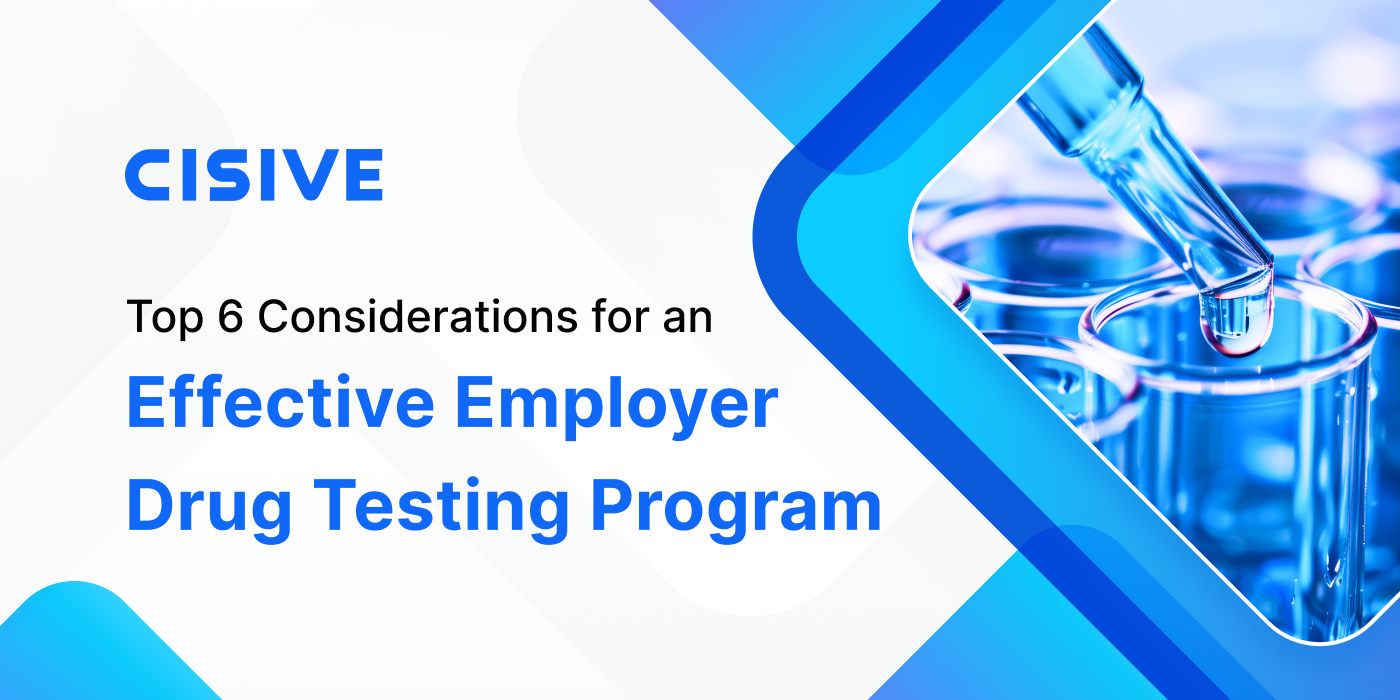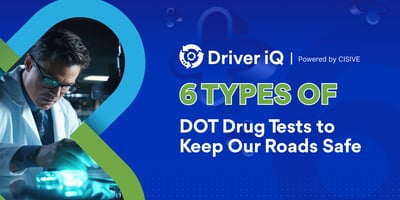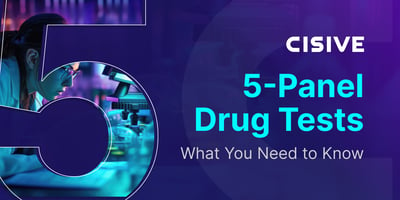

The Department of Transportation (DOT) issued its Final Rule amending federal drug testing...

Employer drug testing is pivotal to ensuring workplace safety, mitigating risks and costs, upholding corporate culture, and maintaining regulatory compliance within specific industries.
However, implementing and maintaining an effective employer drug testing program in today’s modern workforce environment is changing and becoming more challenging. From cannabis legalization and a dispersed remote workforce to employee protection laws and new testing solutions, it’s easy for employers to get distracted by the growing legal requirements and evolving technologies. The result can be an employer drug testing policy and program that is equal parts too vague, too complicated, too costly, and just… too much to understand.
Employers need more guidance on adapting drug testing programs to account for these new challenges while also staying focused on the core mission of any drug testing program - keeping people and workplaces safe.
Key ConsiderationsHere are six considerations to help employers implement an effective drug testing program.
|
Employer drug testing encompasses the systematic screening of employees or job applicants for the presence of drugs or alcohol. This proactive approach aims to safeguard employees and workplace environments, enhance productivity, and uphold organizational values.
Common methods include urine analysis, oral fluid testing, and hair follicle examinations. Urine testing is the most common screening method, according to Quest Diagnostics. However, oral fluid testing has been growing in popularity, has been widely utilized in non-regulated workplace drug testing, and has been authorized by the U.S. Department of Health and Human Services (HHS) and the Department of Transportation (DOT)
(Note: Oral fluid for federally regulated testing is approved but on hold until national laboratories and collection device manufacturers meet the new DOT requirements).
Oral fluid testing can detect the recent use of prohibited substances, enables observed collections, virtually eliminates test cheating, and is rapidly becoming the industry standard for workplace drug testing. Hair drug testing detects drugs embedded in the hair. Hair testing has one of the longest detection windows of all specimen types - up to 90 days - which makes it an ideal test to uncover historical drug use. Emerging technologies such as AI impairment testing, proctored drug screening, and advancements with point-of-collection testing (POCT) products are slowly becoming available as additional screening tools for workplace drug testing.
The regulations governing drug testing vary by local, state, and federal jurisdiction and by industry, so employers may need to consult with experienced screening partners and legal advisors to understand which types of tests are permissible.
Substance abuse is known to contribute to significant issues involving safety, productivity, and employee health in the workplace. Employees who use drugs and alcohol are more likely to contribute to workplace incidents, absenteeism, turnover, and workers’ compensation claims, according to the National Institute on Drug Abuse.
A drug testing program offers advantages for both employers and employees. It is a vital component of an organization’s risk mitigation, employee safety, and corporate culture efforts. Here are some of the benefits an employer drug testing program provides:
Employers demonstrate their commitment to maintaining a secure and productive work environment by prioritizing employee health and safety through proactive drug testing.
In most cases, private, non-regulated employers can decide what drug testing program they want to implement, which specimen to use, and which employees to test. Testing is usually performed in industries considered “safety-sensitive,” for federal government and contractor roles, and any other positions that may pose increased health and safety risks for the public.
Under some state or federal rules, employers may be required to perform drug testing. For example, the heavily regulated transportation industry stipulates that drivers, operators, and other workers pass a pre-employment drug test. Some DOT-regulated employees are also subject to a continuous testing requirement. Other industries likely to conduct drug screening include construction, energy, aerospace and defense, healthcare, and Information Security.
In addition to screening employees based on operational needs, many employers are exploring drug testing programs that do a better job balancing equity and fairness. This may mean implementing an equitable testing program where screening is applied to all employees across organizational levels, from executives to frontline workers. Or, to include contract and remote workers under a drug testing policy that encompasses all personnel impacting workplace safety and culture.
Clear guidelines ensure transparency and mitigate potential disputes related to testing practices. As with most drug testing decisions, consult with legal counsel to help confirm an employer drug testing program complies with all applicable state, local, and federal laws.
Drug testing can be leveraged in various ways to help effectively manage workplace risks and ensure compliance. Most organizations select one of seven standard testing scenarios based on their requirements, size, budget, preferences, and any regulations they need to comply with.
Each testing scenario serves a specific purpose in maintaining workplace safety and adherence to regulatory standards.
Drug testing can be performed at a designated clinic, or on-site via a trained collector. In either location, the specimen must follow a strict chain of custody process for the results to remain valid and defensible in court.
Considerations of privacy and confidentiality are paramount to maintaining employee trust and meeting legal requirements. The location of drug testing and the overall collection process may impact confidentiality, accessibility, and employee comfort.
Most drug tests occur off-site at a collection site. Drug tests performed at these facilities follow a standardized protocol supervised by a trained collector. Even if it’s a collection site with locations across the country, the collection process will be the same at each collection site to help maintain the integrity of the result and chain of custody. This uniformity helps to provide a similar experience for all donors and assists employers in educating their employees about what to expect at their drug test. Drug testing performed at collection sites usually provides a more private experience for donors, but it can take longer to schedule the appointment and may impact an existing employee’s workday.
On-site testing is becoming increasingly popular owing to its convenience and timely collection capabilities. On-site drug testing can primarily be performed in a few different ways. In one scenario, trained collectors will travel to an employer’s on-site collection area and perform the employer’s drug testing needs.
Alternatively, a mobile collection unit may be deployed to an employer’s worksite and trained collectors will perform tests inside the unit, or the collection can be performed by the employer. On-site collections may not be a cost-effective solution for small employers. They may, however, provide larger organizations with a swift and coordinated drug testing solution that reduces wait times and limits disruptions to the workday.
Employers should evaluate their needs and the goal of their drug testing program before committing to a specimen type and a collection site. For more insights, refer to the Substance Abuse and Mental Health Services Administration (SAMHSA) collection site resources page.
Implementing an effective employer drug testing program takes time, expertise, research, and most importantly, a holistic approach. A one-size-fits-all “zero-tolerance” program may no longer be applicable or enforceable, especially as more states legalize drugs like cannabis and pass legislation restricting certain tests or testing scenarios. Before implementing any drug testing program, consult with legal counsel to ensure it complies with all local, state, and federal regulations.
Here are a few considerations to think about when implementing a drug testing program or making changes to an existing program:
Having a drug testing program that aligns with organizational goals is also important to its long-term success. These programs have an immediate impact on employees, operations, and budget so it’s critical to view changes to any drug testing program through various organizational lenses.
Employer drug testing is a cornerstone of modern workplace management, contributing to safety, compliance, and a positive corporate culture. Adhering to legal standards, fostering objectivity in testing policies, and prioritizing employee well-being are crucial ways to mitigate risks and enhance workplace productivity.
For tailored guidance and expert support in optimizing your drug testing program, speak with a Cisive expert today. Our team is ready to assist you in navigating regulatory complexities and implementing strategies that align with your organizational goals.
Author: Jessica McDonald
Bio: Product Strategy and Development, Drug Testing and Occupational Health Subject Matter Expert at Cisive
Let's Connect on LinkedIn
The Department of Transportation (DOT) issued its Final Rule amending federal drug testing...

If you employ commercial drivers, your company is responsible for maintaining a formal drug testing...

Pre-employment drug screening is an important step in making sure you have the right candidates for...